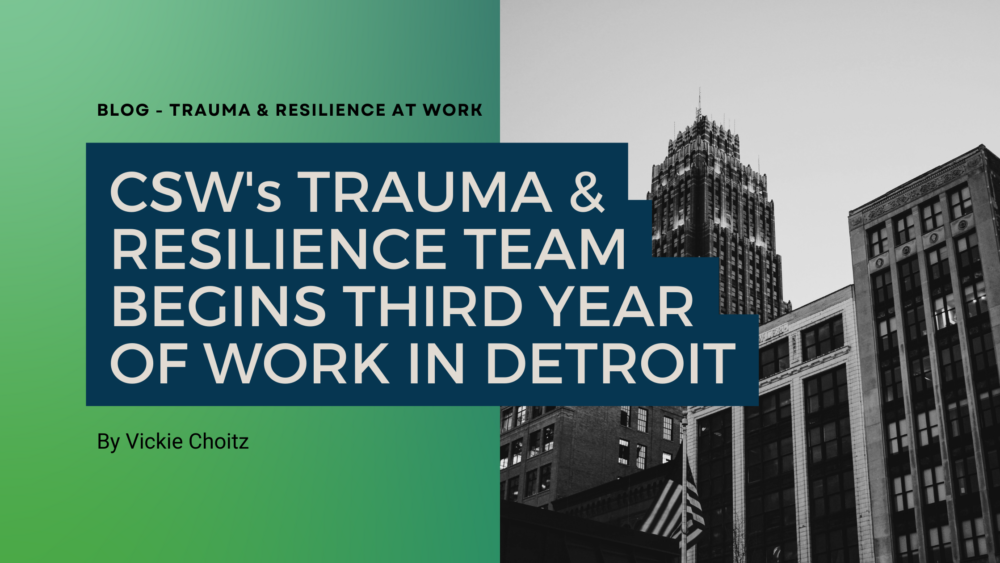The Detroit Employment Solutions Corporation (DESC) has been a pioneer in the workforce development field, making a significant investment over the last two years to help their staff become more trauma-informed and resilience-building for themselves, their customers, and their colleagues. CSW has provided staff training and organizational coaching on topics including the brain science of trauma, adopting new trauma-responsive practices, and cultivating cultures of healing and resiliency within their organizations. DESC is investing in a third year of CSW’s support to deepen and sustain this new way of working.
Why Trauma?
Toxic stress and trauma are prevalent and undermining our ability to succeed at work and in life. Studies on Adverse Childhood Experiences (ACEs), e.g., neglect or abuse before age 18, show that 60 to 70 percent of American adults have experienced at least one ACE. Trauma rewires our brains, which can cause us to be anxious, depressed, angry, or avoidant, depending on the individual. This can harm our relationships and work life. Individuals with two ACEs are 1.5 times more likely to have job problems, 1.4 times more likely to be absent from work (2 out of 30 days), and 1.8 times more likely to have financial problems. These risk rates increase with more ACEs.
ACEs are just one type of trauma. Additional traumas many of us have experienced include Post-traumatic Stress from combat or personal violence; racial trauma; poverty; secondary or vicarious trauma; community violence and mass shootings; and the collective trauma of the COVID-10 pandemic. Trauma has a long tail, and, unless addressed, is likely to harm one’s mental health and success in life for years or decades. Individuals from low-income backgrounds and people of color—the types of participants in most of our workforce development programs—are more likely to experience and be impacted by trauma.
DESC Responds to the Trauma Experienced by Detroiters
Leaders in the Detroit Employment Solutions Corporation (DESC), which oversees the Detroit at Work public workforce development system, recognized these challenges in 2020. They were keenly aware of the historic traumas residents in their city had faced over the decades, including economic collapse from the off-shoring of auto manufacturing, subsequent massive out-migration and unemployment of residents, and damaged communities struggling with lack of good job opportunities and resources. The Detroit community has been impacted by racial trauma exacerbated by practices such as redlining and segregation, as well as ongoing discrimination. Additionally, the COVID-19 pandemic has disproportionately impacted the city’s residents.
Recognizing the need for workforce development organizations to evolve their workforce to be trauma-informed and responsive, DESC issued a request for proposals in 2021 to provide training on trauma and organizational coaching. CSW secured the contract and is now entering a third year providing this support to approximately 350 staff across 17 career centers in Detroit. DESC has deployed the following funding sources to support this investment: WIOA Adult, WIOA Youth Out of School funds, Temporary Assistance for Needy Families (TANF), job training funds from the City of Detroit (American Rescue Plan Act funding), W.K. Kellogg Foundation, and the Ballmer Group.
CSW Trainings for Adult Career Centers
To date, CSW has provided eight trainings for Detroit at Work adult career center staff ranging from Introduction to Trauma and Resilience to Race-Based Trauma to Trauma-Informed Leadership. In the first year, we focused on providing interactive training, while in the second year, we pivoted to providing more experiential learning opportunities to help staff incorporate the new skills and practices into their daily work. Initially, we thought this would mostly focus on better understanding toxic stress and trauma experienced by workforce development customers. However, from the very first training, it was clear that staff also needed more information and support for their own trauma—from the pandemic, sudden shift to working from home, vicarious trauma from customers, and ongoing racial trauma—and how to better support themselves and their colleagues.
CSW also added training sessions specifically for career center directors and managers to provide them with a safe space to discuss and process trauma-related challenges they experienced at work and as leaders. We provided three training courses on healing-centered leadership, the importance of healthy relationships at work, and team building. CSW provided open office hour sessions for staff to discuss specific situations regarding participants, colleagues, or managers.
Trauma and Resilience Ambassadors and Career Center Coaching
In addition to training, CSW experimented with Trauma and Resilience (T&R) Ambassadors. This has become one of the most successful aspects of the project. These ambassadors are champions for integrating trauma-informed and resilience-building practices and cultures into their adult career centers. Through nomination and self-selection, CSW identified approximately forty ambassadors across nine adult career centers at the beginning of year one. This included both frontline staff and managers, which was a good mix of perspectives and decision-making power. CSW has met with the T&R Ambassadors quarterly, sharing guides and resources to help them sustain and deepen trauma-informed and resilience-building practices and cultures in their centers, as well as providing peer sharing and learning opportunities.
CSW also provided coaching sessions for each of the nine adult career centers over the past two years: forty-three sessions across the nine centers. These sessions helped staff and leadership complement their individual learning about trauma and resiliency practices with actions to cultivate healthier workplace cultures.
Training and Coaching for Youth Career Centers
CSW provided staff training and career center coaching for the eight Detroit Youth at Work centers. Staff participated in a new approach called Healing Centered Restorative Engagement (HCRE), developed by Drs. Jess Camp and Tracy Hall. HCRE is a model that shifts organizational practices to center on well-being. It calls for a recognition of problems and strengths, but with a clear call to challenge systems that create inequality and create disconnection from opportunity. This model challenges social problems at their very origins and prioritizes preventative action. The power of this method is that it draws on a fundamentally new and alternative set of philosophical stances, different approaches, and catalyzing practices in response to wicked problems and their impact.
Assessing for Learning and Progress
Throughout the two years, CSW has assessed both staff and the career centers as organizations. Each training session includes a learning assessment to measure how well the training taught the session learning objectives. Overall, participants scored 85-90% across all learning assessments, indicating solid learning outcomes. Interestingly, the more trainings staff took, the more likely they were to indicate the training was useful in their work. Fifty-three percent of staff who had taken 1-3 training sessions agreed or strongly agreed that they used what they learned in their professional work; this increased to 76% for staff who had taken 4-6 training sessions. This underscores that it takes time and practice to learn and apply the skills for being trauma-responsive and resilience-building.
CSW also worked with the ambassadors and career center staff to assess how trauma-informed, healing centered, and resilience building their organizational cultures are. Over the last two years, we have seen steady progress in many of the career centers, but progress has been uneven across the centers. Those centers that embraced the training and coaching are cultivating healthier and more supportive cultures, while the centers with less robust uptake have had flat progress.
The assessment data indicated that racial trauma remains a concern. Cross-tabulation of the data from the Everyday Discrimination Scale with the Professional Quality of Life and the Trauma Informed Systems scales we used shows that staff experiencing more racial discrimination are also experiencing more compassion fatigue, burnout, and secondary trauma. This shows the compounding effects of layers of trauma and how important it is to address racial trauma, discrimination, and inequity intentionally.
DESC Continuing the Journey for a Third Year
DESC understands that becoming trauma-informed and resilience-building is a process and a journey. Therefore, it is investing in a third year of trauma, healing, and resilience training and coaching across the Detroit at Work system. This will include a few introductory training sessions for new staff and any incumbent staff who did not receive the first training or simply want a refresher. It also will include train-the-trainer sessions by Dr. Daicia Price on how to address racial trauma experienced by staff and workforce development participants by dismantling racism in our actions and workplaces. This year also will include deeper coaching with both the youth and adult career centers to embed and sustain healthier workplace cultures utilizing HCRE approaches.
It has been a pleasure and a privilege to work with DESC and Detroit at Work staff over the last two years. DESC has emerged as a courageous leader on a stigmatized topic. CSW applauds DESC’s commitment to the heroic “economic first responders” working hard every day in Detroit’s workforce development system to advance economic opportunity for city residents.



Comments are closed.